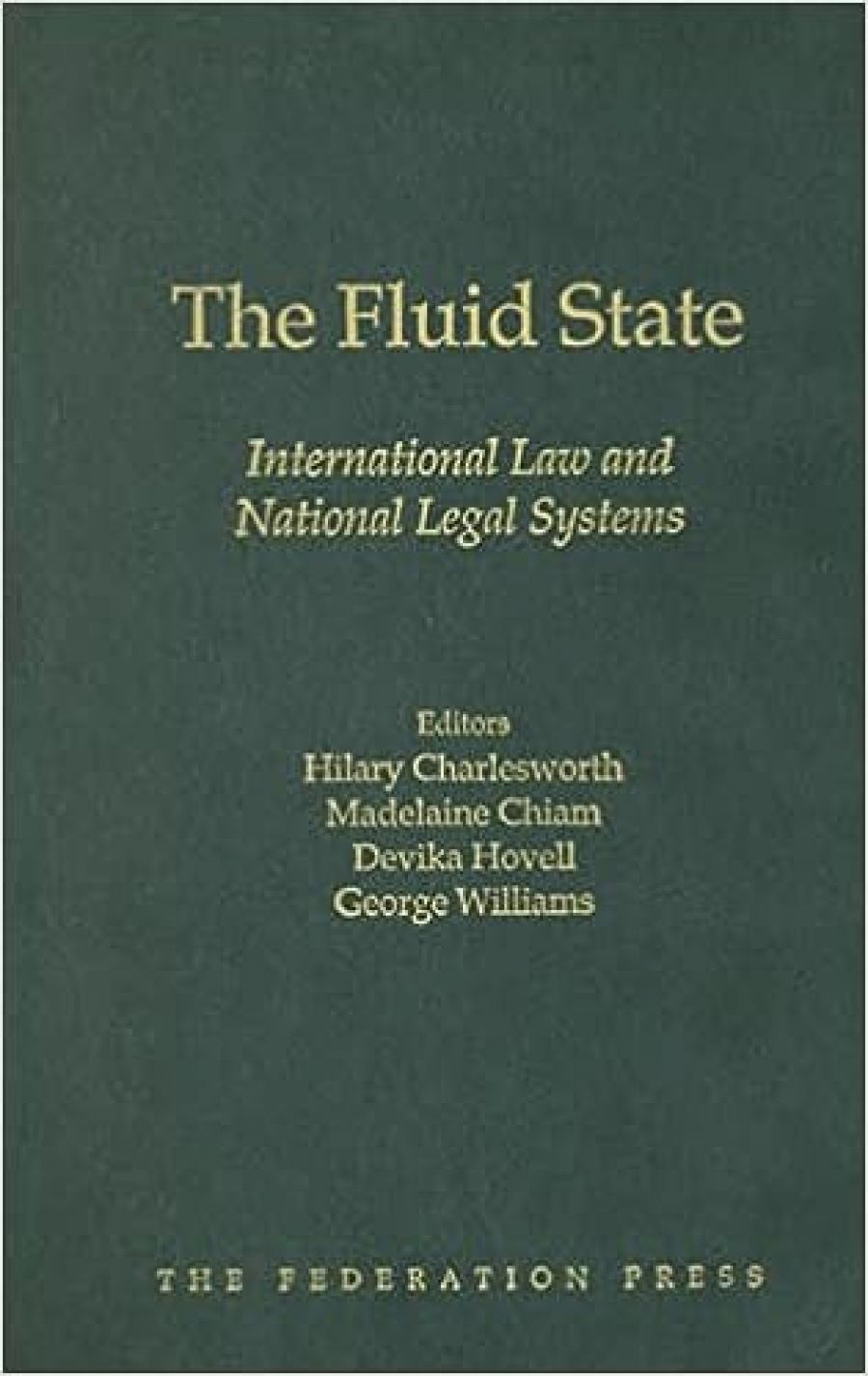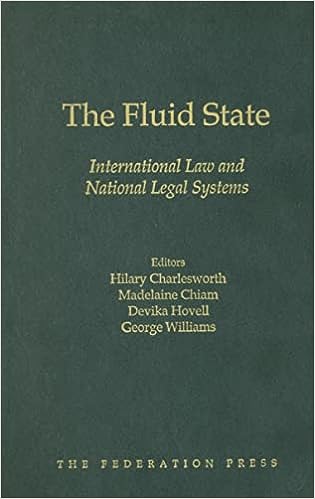
- Free Article: No
- Contents Category: Law
- Review Article: Yes
- Article Title: Common to all mankind
- Online Only: No
- Custom Highlight Text:
What role should international law play in the domestic legal sphere? The author of the Institutes of Justinian stated that ‘[e]very community governed by laws and customs uses partly its own law, partly laws common to all mankind’. Nevertheless, a certain view propounds that international law is an unstable or subversive intrusion into the processes of democratic sovereignty and the pedigree of national law. Such a stance, while persistent, denies social fact; the reach of international legal regulation is unprecedented and national bureaucracies increasingly operate beyond state boundaries. Such is the reality of the ‘Fluid State’ which, the editors of this volume suggest, will alter orthodox understandings of the interrelationship between international and national law.
- Book 1 Title: The Fluid State
- Book 1 Subtitle: International Law and National Legal Systems
- Book 1 Biblio: Federation Press, $125 hb, 286 pp
- Book 1 Cover Small (400 x 600):

Many accounts of the interrelationship between national and international law focus on the role of national judiciaries in receiving or repelling the influence of inter-national law. This volume is welcome for its attention to the parliamentary and executive context.
Pointing to the parliament’s increasing use of its institutional powers of review an inquiry to scrutinise executive action, John Uhr suggests that the Commonwealth parliament is charting a path as a valid participant in national security. Uhr sees the operation of the Joint Standing Committee on Treaties (JSCOT), which was established in 1996 after widespread calls for further parliamentary involvement in the treaty-making process, as indicative of increasing legislative influence in this area. In a detailed chapter that considers the parliamentary response to the Australia–US Free Trade Agreement, Ann Capling provides a more pessimistic assessment of legislative engagement with international affairs, suggesting that, while JSCOT has enhanced parliamentary involvement, it is most useful for confining debate and has not closed the democratic deficit in treaty-making.
As Joanna Harrington points out, in a comparative review of the role of parliaments in treaty-making, JSCOT’s creation was intertwined with the High Court’s 1995 decision in Minister for Immigration and Ethnic Affairs v Teoh, which held that a ratified treaty could have domestic effect without being legislatively enacted in Australia. The decision gave rise to clamorous political attempts to defuse its supposedly anti-democratic ramifications. Wendy Lacey’s thorough comparison of various state practice on the use of unincorporated treaties in administrative law examines how foreign judiciaries have responded to Teoh. While the High Court has indicated an intention to overrule Teoh, the fundamental principles have generated significantly less controversy in other Commonwealth legal systems, especially those that have formally enacted Bills of Rights. Lacey’s chapter implicitly highlights the role such Bills of Rights play in softening domestic reception of international legal principles.
In a similar vein, Mayo Moran contends that international norms comprise an important matrix of background values that exert significant influential force on domestic judicial reasoning. This seems consonant with Lacey’s suggestion that international standards can be used to reinforce principles and guarantees contained within the common law. While Moran’s chapter offers an interesting perspective on the nature of legal authority, reference to the influential authority of international law in recent Australian jurisprudence has been limited; of the current High Court, only Justice Kirby consistently uses principles explicitly drawn from international law in judicial elaboration and justification.
One of the most fraught questions concerns the place of customary international law within the domestic legal order. This is partly because there remains considerable debate both as to how customary international law manifests itself on the international plane, and to what extent it enters the domestic sphere. Chapters by Kristen Walker and Andrew Mitchell, and by Treasa Dunworth, address these complicated issues. Traditional doctrine has it that customary international law either automatically forms part of the domestic legal system (‘incorporation’), or requires domestic implementation to have national purchase (‘transformation’). Dunworth suggests that this debate is increasingly arcane and that it obscures the deeper issue of the extent to which domestic legal systems receive international influences. She suggests that robust debate in the US over the role of international law is more alive to this fundamental issue.
Nevertheless, it is clear that orthodox modes of analysis still exert significant influence on judicial thinking, especially in Australia. Walker and Mitchell review the practice of Australian courts in responding to customary international law (concluding that Australian courts have generally favoured the ‘transformation’ model) and suggest various proposals, differing in scope, for strengthening the role of customary international law in domestic law.
The final section of the volume seeks to engage with national responses to international activity, but lacks the cohesion of the previous sections. Janet McLean examines various conceptions of ‘the State’, Andrew Byrnes considers the role of domestic international legal advisers in the lead up to the war in Iraq, while Fleur Johns pursues an opaque analogy between Marcel Duchamp and the relationship between international and domestic law.
Finally, Ann Kent tests the thesis that liberal states will more readily comply with international law by comparing the recent practice of China and Australia. Her evidence suggests that domestic liberal traditions do not assure compliance with international law. But, as a number of the contributions to this collection demonstrate, sensitive engagement with ‘laws common to all mankind’ reinforces, rather than undermines, national commitment to the rule of law.


Comments powered by CComment